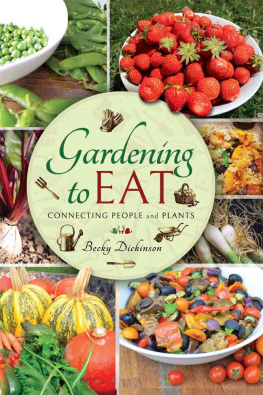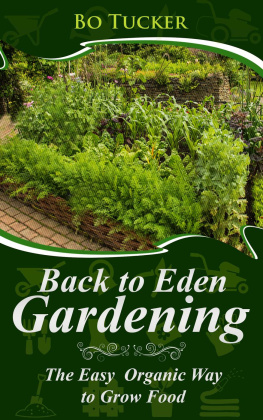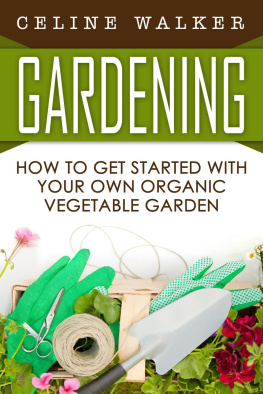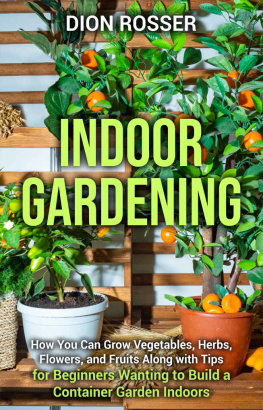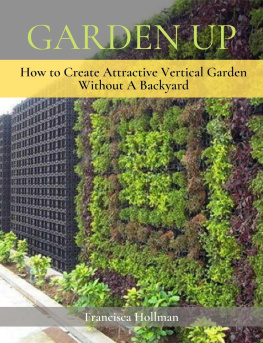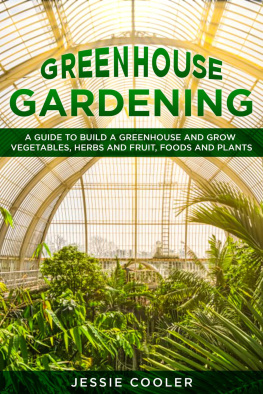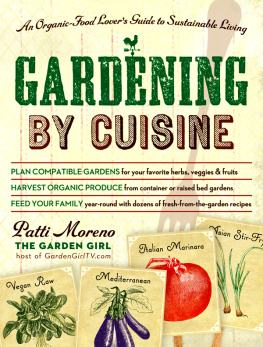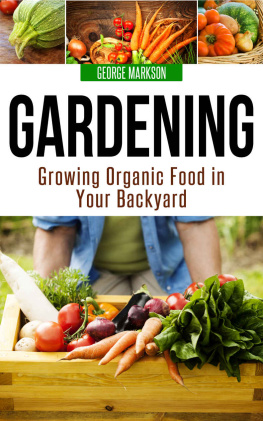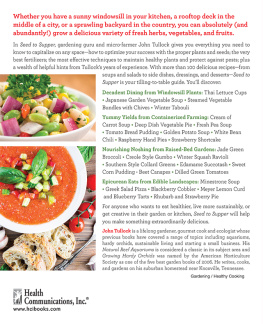Pagebreaks of the print version

Gardening to EAT
Gardening to EAT
CONNECTING PEOPLE and PLANTS
Becky Dickinson
First published in Great Britain in 2021 by
White Owl
An imprint of
Pen & Sword Books Ltd
Yorkshire - Philadelphia
Copyright Becky Dickinson, 2021
ISBN 978 1 52675 720 3
eISBN 978 1 52675 720 3
Mobi ISBN 978 1 52675 720 3
The right of Becky Dickinson to be identified as author of this work has been asserted by her in accordance with the Copyright, Designs and Patents Act 1988.
A CIP catalogue record for this book is available from the British Library.
All rights reserved. No part of this book may be reproduced or transmitted in any form or by any means, electronic or mechanical including photocopying, recording or by any information storage and retrieval system, without permission from the Publisher in writing.
SJmagic DESIGN SERVICES, India.
Pen & Sword Books Ltd incorporates the Imprints of Pen & Sword Books Archaeology, Atlas, Aviation, Battleground, Discovery, Family History, History, Maritime, Military, Naval, Politics, Railways, Select, Transport, True Crime, Fiction, Frontline Books, Leo Cooper, Praetorian Press, Seaforth Publishing, Wharncliffe and White Owl.
For a complete list of Pen & Sword titles please contact
PEN & SWORD BOOKS LIMITED
47 Church Street, Barnsley, South Yorkshire, S70 2AS, England
E-mail:
Website: www.pen-and-sword.co.uk
or
PEN AND SWORD BOOKS
1950 Lawrence Rd, Havertown, PA 19083, USA
E-mail:
Website: www.penandswordbooks.com
PART
Introduction
Why grow food?
What better reason to garden, than to eat? And what better reason to eat, than because youve grown it yourself? Whether you have a sprawling plot, a small back yard, or a few containers, growing your own food will bring you huge amounts of pleasure and an abundance of incredible things to eat, regardless of time and experience.
If youve ever eaten a sun-warmed strawberry, or a tomato straight from the vine, you will know that homegrown, organic food tastes ludicrously better than anything you can buy in the shops. Its also far healthier, since the smaller the gap between picking and eating, the less time there is for nutrients to leach away. Plus, if you stick to natural growing methods rather than relying on synthetic fertilisers and chemical pesticides, theres no need to worry about what else youre getting with your five (or ten) a day.
In essence, growing your own food will help you to eat better and feel better. Its also a great way to connect with nature, switch off from the cacophony of life, and even reduce your shopping bills. Once you start growing food to eat you wont be able to stop, it soon becomes something of an obsession, resulting in a healthy habit for life.
Better for the environment
Flavour, health and enjoyment are just part of the story. Increasingly, growing and eating your own food isnt just about providing fresh, nutritious, ingredients for the table. Its also about protecting the planet from environmental sabotage. Its about standing up to the intensive, modern farming methods that are wreaking havoc on the earth. Practices that are quite literally sucking the life out of the soil like an underground, unseen, deforestation. Every carrot you grow yourself is one less carrot grown at the expense of the planet and the life it sustains. And if enough people grow enough carrots or strawberries, or lettuces, or cauliflowers, or blueberries it may just make a difference.
To illustrate the urgency of this; insects are currently disappearing at a terrifying and unprecedented rate around the world. The latest research shows that more than forty per cent of all species are declining and a third are endangered. The destruction may not be as visible as that of the rainforests, but the wanton use of toxic chemicals and the loss of natural habitats constitute no less of a brutal and unjustifiable war on wildlife. The consequences of this for the natural world are potentially catastrophic. Without insects, whole ecosystems are in danger of collapsing; pollination levels will plummet and food production will fail, and ultimately, so too will life as we know it.
Of course, action needs to happen at a global and political level, but we can all make a difference by growing some of our own food without the use of unnecessary chemicals. Besides the benefits of having a supply of fresh, healthy veg, homegrown food also helps lower the demand for mass-produced crops that rely on pesticides, insecticides and fertilisers. Every carrot really does count. Whats more, by eating seasonally and locally we can slash our carbon footprint by reducing or even eliminating the consumption of products that have travelled half way round the world. The fact that we can eat whatever we like, whenever we want, doesnt mean that we should . Even if it is trending on Instagram.
In the modern era of so-called well-being then, perhaps its time to stop obsessing over avocados and coconut oil, and start focussing on the fruits and vegetables we can grow ourselves organically, ethically, seasonally and sustainably. This doesnt mean turning your back on the modern world; if you want to share your gardening successes on social media, go for it, you never know who else might be inspired to follow. The reality is that few people have the capacity to become fully self-sufficient (although theres no harm in trying if you have the time and resources). But if as many of us as possible grew at least a little of our own food, whether a few rows of beans, a couple of courgette plants, a window box full of salad, a tub of tomatoes or just a few pots of herbs, it could have a huge impact on the environment. Because in the end, its the small changes made by biggest number of people that have the potential to make the greatest difference. Those carrots all add up. And you can find out how easy they are to grow in the next section, along with loads of other brilliant crops.

Only a couple of generations ago, gardening to eat would have been second nature; it wasnt aspirational, or idealistic, or revolutionary, it was just part of life. And its as simple and achievable now as it was then. The only difference is that in the current era of climate crisis and disappearing insect populations, its more necessary than ever. Gardening is no longer just about growing food to eat, it could be a matter of environmental survival.
Better for the body
In addition to the environmental benefits, gardening to eat is one of the best things you can do for your own health. Its a win-win situation, since eating piles of fresh, organic, homegrown fruit and veg can significantly reduce the risk of many of the diseases that are now horribly common in the developed world, including: diabetes, heart disease, Alzheimers and many types of cancer. And of course, theres all that fresh air and exercise that comes with gardening too just mind your back!
Furthermore, there is increasing evidence that a plant-based diet is essential for gut health and this in turn plays a vital role in our overall health, affecting everything from mental well-being to blood sugar levels, immune system, and even our appetite. This is because our general health is strongly influenced by our gut microbiome the trillions of bacteria, viruses and yeasts that exist together inside our digestive tract. These micro-organisms thrive on plant fibre and the more of it, the better. In one study called The American Gut Project, the gut microbiomes of over 11,000 people around the world were analysed. It was found that those who ate the largest and most diverse array of plants had the healthiest microbiomes.

